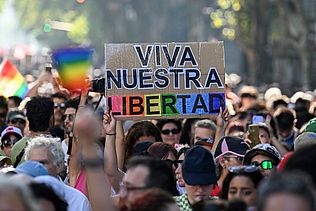US elections have taken place and the outcome can safely be regarded as historic. An overwhelming majority voted for the Republican candidate Donald Trump, who has been propagating misogynistic and racist beliefs for almost a decade, topping it all off with blatant lies. His victory ushers in an authoritarian era for the US, which will be accompanied on the domestic front by a takeover of the courts and dismantling of democratic institutions, the "brutalisation" of migration control and the decline of the welfare state.
Trump's election was also a reactionary decision rejecting "business as usual" with the Democrats, who were unable to present any credible ideas on how to navigate through the global crisis with a new approach. The liberal promise of progress is evidently no longer able to inspire either trust or hope; today it has been reduced to little more than crisis management with a progressive veneer. The fact that the only tangible "alternative" is apparently an authoritarian project by a right-wing populist is evidence of this decline of hope, especially as Trump's success eight years after his first election victory can no longer be considered a chance accident or a protest vote.
His presidency will further deepen the crisis of the US-dominated world order. Ultimately, his threat to reconsider support for NATO, the announcement that the US would stop supplying weapons to Ukraine and the mobilisation of the US-Arab population with a supposed promise of peace for Gaza ultimately decided the election. One thing is clear: professed national interests are top priority in the emerging new world order.
Beyond the US
Trump's "Make America Great Again" has become a rallying cry whose sceptre has been taken up by many other right-wing authoritarian forces around the world. A policy of resentment, which includes getting rid of all those who supposedly do not belong, can be understood in the US and elsewhere as a condemnation and rejection of a society of immigrants. The MAGA movement pledges internal police and economic security, which is to be paid for by withdrawing from responsibility for the world. A world plagued by crises reeling from one catastrophic event to the next is being left to its own devices at a time when almost all major issues that directly affect the US population are global in nature - from the climate disaster to pressing economic challenges. But never fear: we will fly to Mars with Elon Musk instead of solving the problems here on earth.
The consequences of this policy will be felt by the disenfranchised and those in need worldwide; just like in Afghanistan in 2021, in the wake of the withdrawal of US troops proclaimed by Trump and then carried out by Biden; or when the US military withdrew from the border region of north-eastern Syria in October 2019, paving the way for an expansion of Turkish-occupied territory. Once again, it can be assumed that Palestinians, Kurds and Ukrainians will pay the price for "America First".
Promised and broken
What has been increasingly manifesting itself for years may now finally be coming to an end. After the end of the Cold War, the West, under the leadership of the US, carried the beacon of democracy, human rights and universal freedoms. It not only viewed itself as the victor of 20th century history. It even believed in the end of history, assigning itself a trustee role as guardian of the present. The West's program of defending democracy and human rights began to display deep cracks at the latest over two decades ago with the "war on terror", in which universal human rights were cast aside in many places. The wars and military operations carried out under this facade were legitimised by citing the concepts of democracy and freedom - grand words and promises that as it turned out could not be kept. The Iraq war was then started in 2003 with a lie. Although it put an end to Saddam Hussein's murderous regime, the country has yet to recover from the neoliberal transformation initiated under the leadership of the post-imperialist USA. On the contrary: Islamic State's campaign of terror amplified the trauma of brutal violence. In Afghanistan, twenty years after the US-led military operation got underway, hundreds of thousands of people hastily attempted to leave the country. To this day, those who were unable to flee remain abandoned by those who had promised to bring them justice and rights. The international community's inability to take action to stop the Assad regime in its murderous war against its own people and ensure adequate humanitarian aid was yet another milestone in the decline of multilateral institutions. Russia's and China's obstructionism on the UN Security Council made any humanitarian or peace policy initiative virtually impossible.
The liberal representatives of the Western powers still invoke the old principles, only to then betray them in the same breath. Nowhere is this more evident than in their support for Israel in Gaza. In the meantime, key Western states such as Germany and the US are ignoring international law, or adopting an instrumental approach whenever it serves their own interests. In the action taken by South Africa with the International Court of Justice (ICJ), they have ignored the Court's order for civilians to be protected in Gaza to prevent genocide. While many in the global South are standing up for international law and multilateral institutions, Germany is also guided by its own raison d'être. Western dominance in the multilateral institutions of the United Nations continues to wane. While NATO can no longer convincingly deliver on its previous security pledge in the long term, other and newly forming centres of power such as the BRICS states, China and the African Union are working to reorganise global hierarchies. The outcome is uncertain.
All of this is symptomatic of political developments worldwide, including in Europe and in Germany, where the "progressive cycle" also seems to be drawing to an end with the collapse of the "traffic light coalition". Lacking any idea about how to surmount systemic errors and the idea instead being to prolong the present with green capitalism and liberal social policy, the German "progressive coalition" has now gone belly up. As things stand today, its political legacy is above all an anti-Semitism resolution, possibly the final culmination of a policy of raison d'être that advocates an authoritarian state, seeks to ban critical artists from their profession and wants to control immigration based on relations with Israel.
Against world ignorance
What now follows in the wake of the red-green-yellow coalition will probably fall into line behind the global trend towards right-wing authoritarianism - at least the racist migration debate surrounding the border closures in recent months suggests this. In Europe, majorities in favour of such ideas are having a hey-day: isolationism and renationalisation are trending upward.
In these times, in which everything seems to be torn asunder, a high degree of steadfastness and resilience is needed from civil society. The end of the liberal promise of progress for the time being along with an intensifying string of disasters will not eliminate the structural causes of inequality and exploitation, and will instead exacerbate them. The need for humanitarian aid will continue to mount in the face of more difficult conditions. In view of global constellations and lines of conflict, it will not automatically be possible to come to the aid of those in absolute need, as we are currently witnessing in Gaza or has been the case in Syria for many years. Moreover, aid and the commitment to human rights have become a target in the right-wing authoritarian rule project.
In her work "The Origins of Totalitarianism" (1951), Hannah Arendt discusses the loss of public space as a decisive factor in the emergence of totalitarian movements. This also holds true today. It has once again become more important to create spaces for critical debate and social self-understanding. Now that state-financed spaces are closing in many places, political aid also has the task of opening up new spaces and standing up for them. Only in this way can a multi-perspective culture of remembrance, which is consistent with a society open to immigration and which we especially now have to fight for, be re-established. This is the only way to counter hatred, racism and global ignorance.


